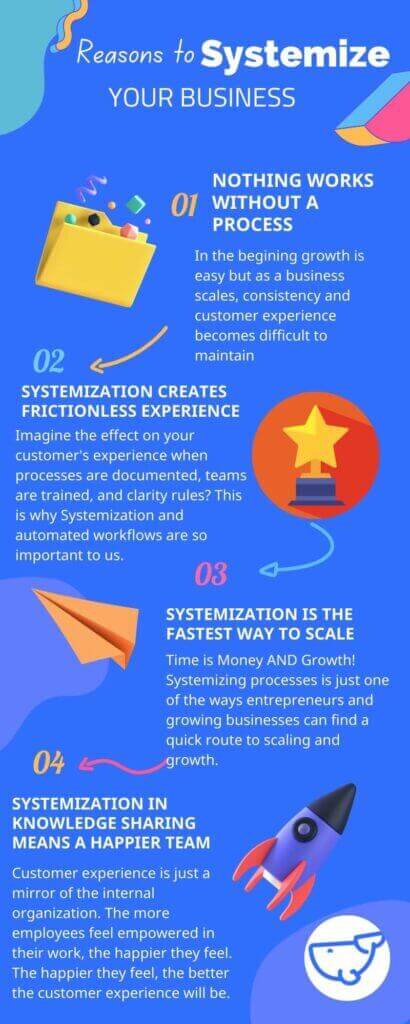Entrepreneurs know that changing the world starts with big ideas that drive growth and scale. Yet, turning those ideas into sustainable success requires more than just vision—it demands structure, consistency, and efficiency. Systemizing your business transforms ambitious ideas into scalable, actionable steps that can be executed repeatedly with predictable results.
When businesses lack proper systems, even the most brilliant strategies fall short. The reality is that 94% of business problems result from faulty processes, not people (W. Edwards Deming). This guide will walk you through everything you need to know about business systemization—why it matters, when to implement it, and how to do it effectively.
What Does It Mean to Systemize Your Business?
Systemization is the process of creating standardized, documented procedures for every core function within your organization. It’s about transforming the knowledge in your team’s heads into accessible, repeatable processes that anyone can follow.
Defining and systemizing business processes is crucial because it creates consistent, repeatable steps that drive productivity, save time, and foster growth. For example, an EOS-driven, systemized business can scale its workforce, enhance the customer experience, and minimize disruptions when key team members are unavailable.
That’s not to say you have to use EOS (Entrepreneurial Operating System) to systemize your business. Even if you don’t use a formal business framework, you should prioritize systemization if you want sustainable growth.
When Should You Systemize Your Business?
Timing is everything. Here are some signs that it’s time to start systemizing:
- Your business is growing fast: A growing workload can impact service quality. Systemizing early helps maintain high standards.
- You’re hiring new people: When roles are clearly defined, new hires can jump in without missing a beat.
- You’re outsourcing tasks: Outsourcing works best when expectations are clear, and systemized processes make that easy.
- You need more freedom: Want more time for strategy and less time managing daily tasks? Systemizing is the way forward.
Reasons to Systemize Your Business

1. Nothing Works without a Process
Our co-founder, Gary Vanbutsele, learned this firsthand in 2018. Even with documented processes, a lack of proper systems forced him to repeatedly address the same issues. As Michael Gerber states in "The E-Myth Revisited," "Systems run the business, and people run the systems."
Without well-designed processes, businesses operate in reactive mode—constantly putting out fires rather than preventing them. When processes are clear and systematic, teams can focus on execution rather than reinventing the wheel with each new challenge.
2. Business Processes Create a Frictionless Experience
Your customer experience directly reflects your internal organization. When your team follows consistent, well-structured workflows, clients receive a seamless experience at every touchpoint. Consider how companies like Apple or Amazon deliver remarkably consistent customer experiences—this is the power of robust internal systems at work.
Research shows that 96% of customers say customer service is important in their choice of loyalty to a brand (Microsoft). Systemized processes ensure that every customer interaction meets your quality standards, regardless of which team member handles it. Check out our piece on essential Customer Service SOPs.
3. Systemization is the Fastest Way to Scale
Creating systems isn’t just about efficiency; it’s about freeing up time for high-value tasks that drive growth. When routine operations run smoothly without your constant attention, you can focus on strategic initiatives, market expansion, and innovation.
Companies that effectively systemize their operations grow 2-3x faster than their competitors (Bain & Company). This is because systemization allows for:
- Predictable outcomes: Knowing exactly what resources are needed for specific results
- Efficient resource allocation: Minimizing waste and maximizing productivity
- Faster decision-making: Clear processes reduce bottlenecks in approvals and implementation
- Easier delegation: Tasks can be assigned confidently when processes are well-documented
4. Systemization Leads to a Happier, More Engaged Team
At Whale, we believe that simply having processes isn’t enough—true systemization is what empowers teams. When employees have clear guidelines and tools, they experience less stress and greater confidence in their work.
Studies show that employees who clearly understand their role and responsibilities are 23% more likely to stay with their company (Gallup). Systemization provides this clarity while also creating opportunities for growth and ownership within defined processes.
Well-designed systems also reduce workplace friction and conflicts by establishing clear expectations and accountability. This leads to a more collaborative, positive work environment where teams can thrive.
Step-by-Step Guide to Systemizing Your Business
1. Identify Core Business Processes
List all key workflows (Sales, Marketing, HR, Customer Support, etc.). Focus on tasks that are repetitive and impact efficiency.
2. Document Your Processes
Use Standard Operating Procedures (SOPs) and Checklists to outline step-by-step instructions.
3. Automate Where Possible
Reduce manual work with automation tools:
- CRM Software (HubSpot, Salesforce) – For sales tracking
- Email Automation (Mailchimp, ActiveCampaign) – For marketing
- Accounting Software (QuickBooks, Xero) – For finance
4. Assign Clear Roles & Responsibilities
Use the RACI Framework (Responsible, Accountable, Consulted, Informed) to ensure accountability for all roles.
5. Train Your Team
Provide training through video tutorials and SOP playbooks in the form of micro-learning.
6. Monitor, Optimize, and Improve Continuously
Systemization isn’t a one-time fix—it requires ongoing refinement. Gather feedback, track KPIs, and update processes as needed.
7. Use a Centralized System
Keep all processes, documents, and tools in a single source of truth like Whale for easy access and seamless integration.

Getting Started with Systemizing Now
The journey to a fully systemized business doesn’t happen overnight, but you can begin making progress immediately:
- Today: Identify your three most critical or problematic processes (Use the 80-20 rule to do this)
- This week: Document one complete process using a simple template
- This month: Implement your first documented process and measure results
- Within 90 days: Create a complete process inventory and prioritization plan
Remember that perfectionism is the enemy of progress when it comes to systemization. Start with "good enough" documentation that can be improved over time.
Common Challenges to Systemizing
Resistance to change
Many team members may resist new systems, fearing rigidity or increased oversight.
Solution: Involve team members in creating processes, emphasize how systems make their work easier, and celebrate early wins.
Documentation overwhelm
The prospect of documenting everything can seem impossibly daunting. So you do nothing! We call it process paralysis.
Solution: Start with your most critical 3-5 processes, use templates, and gradually expand your documentation over time.
Keeping processes updated
Outdated processes can be worse than no processes at all.
Solution: Assign automated process reminders with SOP Software like Whale.
FAQs about systemise your business
What are the benefits of systemization?
Systematizing in business happens whenever you establish a process that can be repeated. For instance, when you create and document a consistent method for managing vendor invoices, you are effectively systematizing that invoicing procedure.
What is an example of systematizing?
Standardizing processes allows businesses to replicate and grow their operations with ease. New hires can follow clear, proven steps, ensuring uniformity throughout. Additionally, systematization helps pinpoint areas of inefficiency, streamline tasks, and scale up without compromising on quality or productivity.
What are the steps to systematize your business?
The systematization process can be summarized in these 4 steps:
- Document key processes: identify and write down the core tasks that drive your business.
- Standardize procedures: create clear, repeatable procedures to ensure consistency.
- Automate tasks: use tools and software to automate repetitive tasks.
- Delegate and train: assign clear roles and train your team to follow the established processes.


